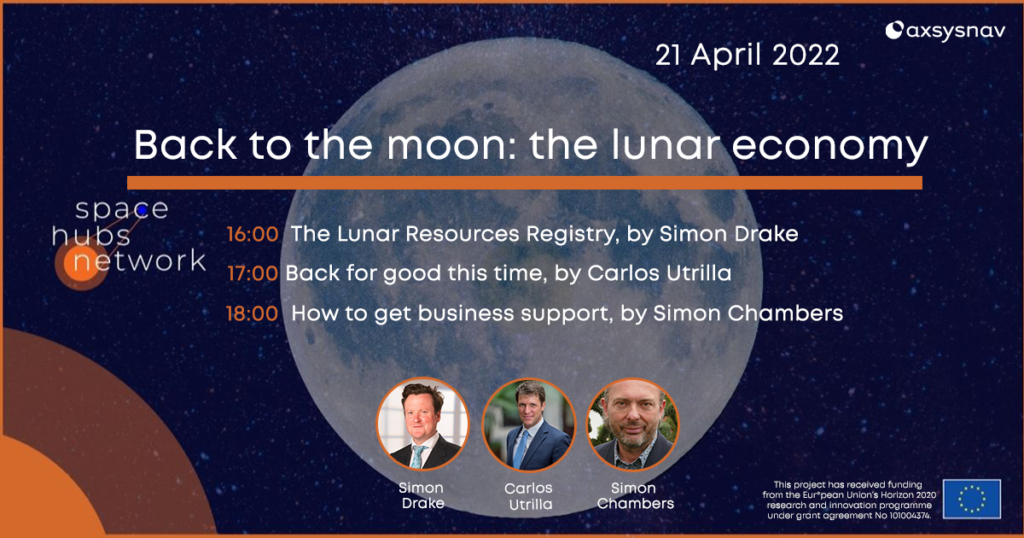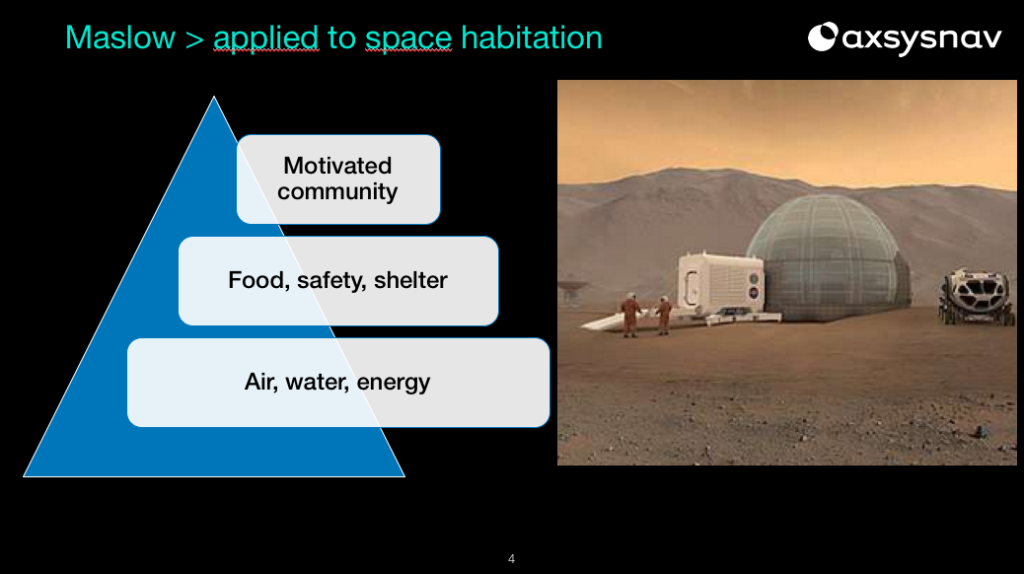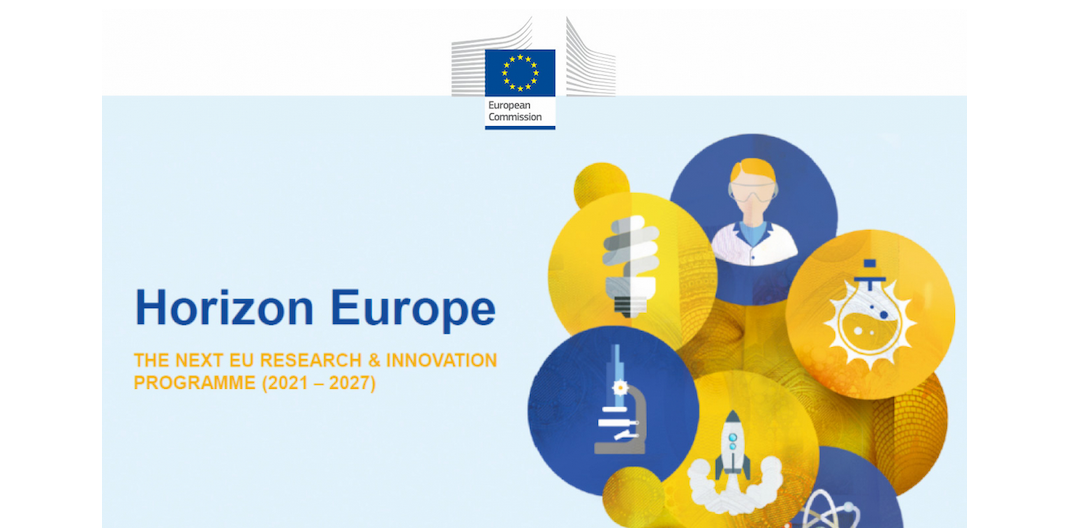Here’s a video of what we’re achieving for European startups via our Space Hubs Network.
Axsysnav – a space business
Established 15 years ago in Toulouse, the company carries out studies, business consulting and project management in the following areas: Wildfire detection and management, space robotics and applications using space data. Clients are from space agencies, public organisations and the private sector (entrepreneurs, SME and blue-chips).
Back to the Moon – the Lunar economy
The event was recorded; https://lnkd.in/edBwiksn#lunar_economy

Just a reminder that the SUN roadshow entitled Back to the Moon – the Lunar economy is on Thursday 21st April from 16-18 CEST. The online event will be of interest to all players in the burgeoning Lunar economy and budding space entrepreneurs. The SUN spacehubs.network provides business support for entrepreneurs and SME to get more involved in space. With presentations by Simon Drake from the Lunar Resources Registry and Carlos Utrilla from Plus Ultra Space Outposts, we get right to the heart of the matter!
16:00 Welcome
16:10 The Lunar Resources Registry, by Simon Drake
17:00 Back for good this time, by Carlos Manuel Entrena Utrilla
18:00 How to get business support from the spacehubs.network, by Simon Chambers
This is a SUN roadshow, register here for the event.
Copernicus space data
Great presentation on how #copernicus can help understand climate change, by Hugo Zunker at the EUSPA event. Image shows land temperature and precipitation, estimated change through to 2090.

The €15bn unified EU space programme
The European Parliament has finalised a new €14.8 billion seven-year EU space program, which will for the first time bring together all EU space activities under one roof. Running the space program under a single regulation is intended to get rid of redundancy and overlaps between the European Space Agency and the European Commission. The goal is to make the EU a global player in space, rivaling the position of the US and China.
The programme will support existing EU space initiatives, such as Galileo and Copernicus, as well as some new tools for space surveillance and satellite communications. €9.1 billion will fund the satellite navigation system Galileo, and the European Geostationary Navigation Overlay service, which supplements Galileo’s observations by double-checking the accuracy of its positioning data. Another €5.42 billion will be invested in the Copernicus earth observation system, to run services monitoring the atmosphere, marine and land environments, climate, emergencies and security.
All this will be overseen by three institutions. The Commission will manage the overall programme; the new EU Agency in Prague for the Space Programme (EUSPA) will manage Galileo and the European Geostationary Navigation Overlay Service; while the European Space Agency will be responsible for research and development.
Horizon Europe 2021-2027 provides €95 billion for research and innovation
Horizon Europe, the EU research and innovation programme will have a budget of around €95.5 billion for 2021-2027. This includes €5.4 billion from NextGenerationEU (see post below) to boost recovery and make the EU more resilient for the future, as well as an additional reinforcement of €4.5 billion. Overall this represents a 30% increase vis-à-vis the current research and innovation programme, Horizon 2020 and makes it the most ambitious research and innovation programme in the world.
The aim is to strengthen the region’s scientific and technological base, develop solutions for healthier living, drive digital transformation and fight climate change, for the EU’s collective resilience. This political agreement is now subject to formal approval by the European Parliament and Council.
How to live in space
Axsysnav has performed a study for the French space agency (CNES) that created a database of organisations working in the area of space habitation. A public-friendly extract of the data has been prepared and made into a presentation. We invite you to have a look at how humans could be living on the moon, mars and beyond in 2040.

Next Generation EU Instrument
Covid-19: The Next Generation EU instrument will enable the EU to overcome the pandemic and to deliver a systemic change in Europe. The need for Europe to lead the green and digital transitions and make its societies and economies more resilient has never been more urgent. Now, the vision of building a fairer, healthier, greener and more digital society has been mapped out.
The proposed Commission Work Programme 2021 has six headline ambitions:
- Within the European Green Deal, the focus will be on reducing emissions by at least 55% by 2030, as compared to 1990 levels. This will be brought together in a Fit for 55 package, which will cover everything from renewables to energy efficiency, buildings, as well as land use, energy taxation, effort sharing and emissions trading. The European Green Deal reflects the systemic nature of the green transition and its importance as a growth strategy: carbon border adjustment mechanism, smart and sustainable transport, circular economy actions plan, EU biodiversity strategy for 2030 and farm to fork strategy.
- A Europe fit for the digital age proposes a roadmap with clearly defined goals for 2030, such as connectivity, skills and digital public services. The approach follows clear principles: the right to privacy and connectivity, freedom of speech, free flow of data and cybersecurity.
- Efforts within the economy that works for the people will ensure that health and economic crisis does not develop into a socal crisis. This will guide ECs action throughout the implementation of the SURE programme that will help workers keep their income and ensure businesses retain staff. Proposed actions within this headline ambition are: the European Pillar of Social Rights, European child guarantee, EU strategic framework on health and safety at work, an action plan for the social economy, Economic and Monetary Union, sustainable corporate governance and EU green bond standard.
- A stronger Europe in the world aims at advancing EU strategic interests and objectives abroad and defending the rules and values-based international order in an increasingly polarised world. The Commission will work to enhance the Union’s global role as an anchor of responsibility, stability, cooperation and solidarity.
- Promoting our European way of life means to reinforce the EU’s framework for detecting and responding to serious cross-border health threats. The Commission proposes to “establish an agency for biomedical advanced research and development, a new pharmaceutical strategy that will look at the security of Europe’s supply chain and ensure citizens can rely on safe, affordable and high quality medicines. Moreover, the European health data space will be launched by the end of 2021 to harness data for better healthcare, better research and better policy making to the benefit of patients”. Further initiatives: new strategy for the future of Schengen, new pact on migration and asylum, strengthening the Security Union, strategy on combating antisemitism, initiative on individual learning accounts, European approach to micro-credentials.
- Through a new push for European democracy, the Commission will continue to build a Union of Equality and uphold Europe’s commitment to the protection of EU values as well as inclusion and equality in all of its senses, irrespective of sex, racial or ethnic origin, religion or belief, disability, age or sexual orientation by proposing: EU disability rights strategy, EU strategy on the rights of the child, an action plan to combat gender-based violence, the European Democracy action plan to improve the resilience of our democracies, an action plan to address the threats of external interference in European elections and counter disinformation, to enforce clearer rules on the financing of the European political parties, as well as to support free and independent media.
With these opportunities in mind, contact AXSYSNAV, a company specialised in space applications and member of the EIC network for further information on how we obtain funding for your projects that address these issues. We a have a current success rate close to 60% for obtaining an EU grant.
European Space Week in Marseille
We are at the European Space Week, being held in Marseille from 3-6 December. Over 1000 delegates learning about the latest developments and business opportunities in GNSS and Copernicus.
Simon Chambers, MD of Axsysnav, is mentoring winners selected by the Copernicus Accelerator, for the third year running: “a great enabler to get your idea to market, this year there are many projects in the area of climate change, resource management, air quality monitoring and forest management”. The companies being mentored will benefit from one year’s coaching by dedicated European professionals.
The European Commission has estimated that between 2017 and 2035, Copernicus will generate at least €67 billion in benefits for European society. In economic terms, the sector has experienced an AGR of 17% on average between 2014 and 2017.
Contact us today for more details about how you can get involved in the Earth Observation industry!
Copernicus mentoring for the European Commission
The European Commission, in the frame of the H2020 programme, has re-appointed Simon Chambers, for the fourth consecutive year as a business mentor to help create innovation in the Earth Observation sector (safety, environment, transport and climate).
Private companies, equipped with an EO application idea, will benefit from business process mentoring in order to get their service to market as soon as possible.
SME from all over Europe are eligible for this support in order to foster innovation and create new opportunities in this exciting market. Have a look www.copernicus.eu
Simon Chambers is also a certified coaching for another EC programme, the H2020 SME Instrument and has performed over 20 assignments for private companies in Europe.





 English
English Français
Français